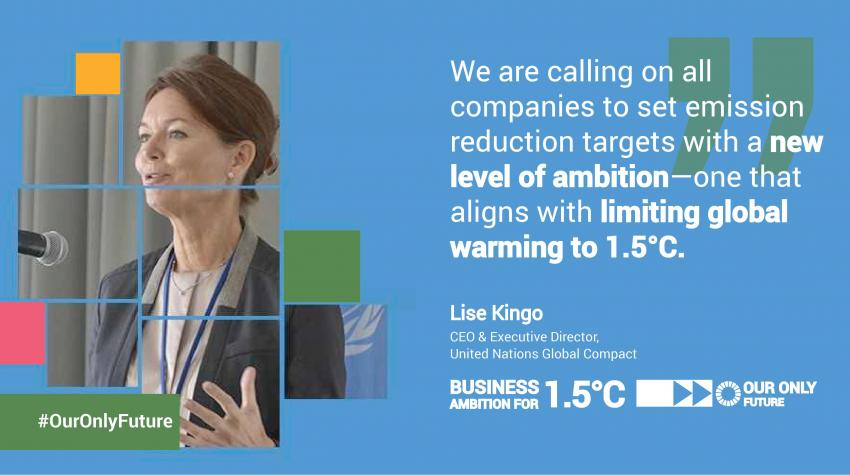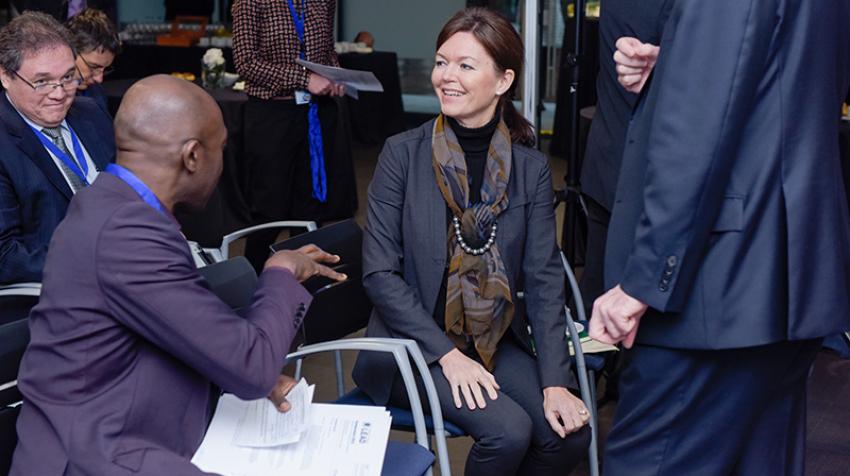It has been four years since the adoption of the Sustainable Development Goals (SDGs) in September 2015, and while significant progress has been made on raising awareness of the 2030 Agenda for Sustainable Development, we are not yet on track to meet any of the goals by the target dates.
While the United Nations needs to put the right plans and policies in place, it will also need to cultivate partnerships with Governments, civil society and the private sector to harness the resources, and innovate the ideas and skills that we so desperately need to turn the vision of the 2030 Agenda into a reality.
As the world’s largest corporate sustainability initiative, anchored in the United Nations and encompassing the Organization’s principles and values, the United Nations Global Compact is uniquely positioned to foster this collaboration to deliver and scale up solutions that address global challenges. Built on the vision of former United Nations Secretary-General Kofi Annan, who, at the 1999 World Economic Forum, called on business leaders to partner with the Organization to create a “global compact” of shared values and principles to give a human face to the global market, the Global Compact today plays a key role in strengthening business collaboration with the United Nations.
The UN Global Compact is a call to companies to align their strategies and operations with ten universal principles related to human rights, labour, environment and anti-corruption, and take actions that advance societal goals and the implementation of the SDGs. By engaging thousands of companies of all sizes and sectors from around the world, we are working to mobilize a truly global movement of responsible enterprises that embed sustainability into their core strategies and operations—not only for the benefit of their societies but for their own benefit, as well.
The Ten Principles of the UN Global Compact
Derived from core United Nations conventions and declarations, the Ten Principles of the UN Global Compact are recognized and endorsed in numerous intergovernmental resolutions and outcome documents, including General Assembly resolutions. To join the UN Global Compact, a company’s highest-level executive publicly commits to the Secretary-General that the company will take a responsible, principle-based and integrated approach to addressing United Nations development goals guided by the Principles, signalling the company’s potential to be a strong, long-term partner of the Organization. The Ten Principles of the UN Global Compact are:
Human Rights
Principle 1: Businesses should support and respect the protection of internationally proclaimed human rights; and
Principle 2: make sure that they are not complicit in human rights abuses.
Labour
Principle 3: Businesses should uphold the freedom of association and the effective recognition of the right to collective bargaining;
Principle 4: the elimination of all forms of forced and compulsory labour;
Principle 5: the effective abolition of child labour; and
Principle 6: the elimination of discrimination in respect of employment and occupation.
Environment
Principle 7: Businesses should support a precautionary approach to environmental challenges;
Principle 8: undertake initiatives to promote greater environmental responsibility; and
Principle 9: encourage the development and diffusion of environmentally friendly technologies.
Anti-Corruption
Principle 10: Businesses should work against corruption in all its forms, including extortion and bribery.
With more than 9,500 companies and 3,000 non-business signatories based in over 160 countries—including a majority based in developing countries—and 70 local networks, we are spreading the word far and wide that businesses everywhere can play an important role in improving our world. By bringing to the table a diverse range of stakeholders from government, investor groups, academia, civil society and beyond, we provide opportunities for strong partnerships and a framework through which the private sector can take concrete action to do business responsibly and keep their commitments to society.
As the current United Nations Secretary-General, António Guterres, has said, “The private sector can and must play a central role in this effort by advancing international cooperation, engaging in public-private partnerships, finding innovative solutions to shared challenges and doing business responsibly.”
At this pivotal moment in United Nations development system reform, taking partnerships to the next level has never been more important. A recent study shows that while 100 per cent of United Nations leaders surveyed believe that greater collaboration across sectors will be critical in advancing the 2030 Agenda for Sustainable Development, only 59 per cent think that the Organization is currently doing enough to engage with the private sector.1
Transforming Partnerships for the SDGs
In the UN Global Compact-Accenture Strategy CEO Study, the largest study of CEO opinions on sustainability, we described an emerging pathway for business on sustainability. The adoption of the Sustainable Development Goals, said CEOs, gave business a clear mandate and roadmap to scale up their efforts.

Business Leaders Are Committed to Stepping Up Partnerships
- 87% believe the SDGs provide an opportunity to rethink approaches to sustainable value creation
- 89% say commitment to sustainability is translating into to real impact in their industry
- 85% see cross-sector partnerships as critical to enabling business to help achieve the SDGs2
Following a decade of research into the views of business leaders worldwide, the study also examined the views of United Nations leaders. A rapid scaling up of cross-sector partnerships is essential to accelerating progress on the SDGs. This is the unanimous view of leaders surveyed as part of landmark research on the past, present and future of partnerships between the Organization and business.
The fastest path to achieving the world we want by 2030 is by making a strategic pivot. We need to move from short-term, small-scale partnership projects to long-term, transformational, multi-stakeholder partnerships with the potential for scalable impact.
The fastest path to achieving the world we want by 2030 is by making a strategic pivot. We need to move from short-term, small-scale partnership projects to long-term, transformational, multi-stakeholder partnerships with the potential for scalable impact. A prime example of how the UN Global Compact does this is through our Action Platforms that establish multi-sectoral and multi-stakeholder partnerships to solve complex challenges and fill emerging gaps in meeting the SDGs through time-bound and clear deliverables. These platforms foster strong, business-driven action rooted in inputs from partners across the board. This approach has seen significant measurable impact in areas such as water stewardship, SDG reporting, financial innovation and global supply chains. For example, our Sustainable Ocean Business Action Platform has mobilized more than 40 major international civil society and private sector organizations to take tangible action, make investments and form partnerships together with governments to leverage the ocean as a resource to deliver the SDGs.
The recent launch of our Business Ambition for 1.5°C: Our Only Future campaign is a similar example of how we are working together with partners to mobilize companies at a global level in the lead-up to the Secretary-General’s Climate Action Summit in September 2019.
Business Ambition for 1.5°C: Our Future
Climate change is undoubtedly the defining issue of our time—and we are at a pivotal moment. Climate change is accelerating by the day, and as the recent report by the Intergovernmental Panel on Climate Change (IPCC) shows, every half degree makes a world of difference. We have the innovation, tools and expertise to get back on track. What we need now is leadership and strong partnerships.
That is why, in the lead-up to the Secretary-General's Climate Action Summit in September 2019, the UN Global Compact is mobilizing a global network of UN agencies, business organizations and industry partners who have come together to collectively call on companies to step up and commit to set science-based targets aligned with limiting the global temperature rise to 1.5°C above pre-industrial levels.
At the national level, 70 Global Compact Local Networks enhance the capacity of companies to partner with governments, local agencies, civil society and a wide range of other stakeholders to advance the implementation of the SDGs and national development priorities on the ground. Our Local Networks also help companies understand what meaningful partnerships look like in different national, cultural and language contexts to facilitate outreach, learning, policy dialogue and collective action. Through our Making Global Goals Local Business campaign, the UN Global Compact is mobilizing organizational action locally to advance the implementation of the 2030 Agenda at the national level.
This year, seven Global Compact Local Networks will host regional or national Making Global Goals Local Business events. At a recent event in Mexico, I welcomed the signing of a Collaboration Agreement between the Global Compact Network Mexico, the Mexican Government and the private sector, highlighting the success of the campaign in forging meaningful partnerships that have the potential to generate real impact.
Around the world, multisector partnerships have become the new normal, and as we move towards the shared responsibility of implementing the SDGs, these partnerships are more important than ever before. We need leaders of all kinds to step up and ensure that no one is left behind as we develop our communities, societies and nations in a profitable yet sustainable and responsible way. It is only through true collaboration that we can create a truly global movement of responsible companies and stakeholders committed to creating the world we want.
Notes
- The UN Global Compact and Accenture Strategy, “Transforming Partnerships for the SDGs. Special Edition: The UN Global Compact–Accenture Strategy CEO Study (2018), 11. Available at https://www.accenture.com/_acnmedia/PDF-74/Accenture-Transforming-Partnerships-for-the-SDGs-UNGC-Accenture-Strategy.pdf#zoom=50.
- Ibidem.
The UN Chronicle is not an official record. It is privileged to host senior United Nations officials as well as distinguished contributors from outside the United Nations system whose views are not necessarily those of the United Nations. Similarly, the boundaries and names shown, and the designations used, in maps or articles do not necessarily imply endorsement or acceptance by the United Nations.




